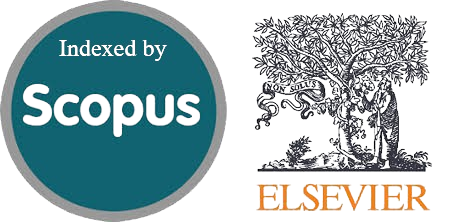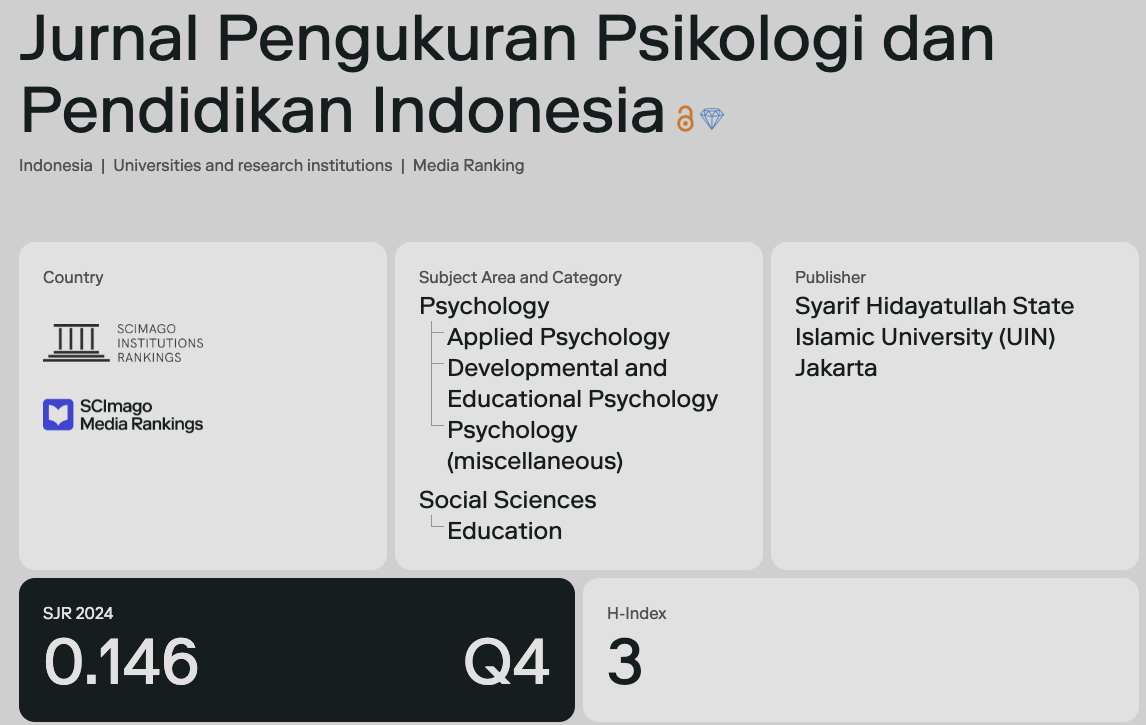Pengaruh Hubungan Big Five Personality, Perilaku Hidup Sehat, dan Indeks Massa Tubuh Terhadap Intuitive Eating pada Siswa SMA di Wilayah Malang
DOI:
https://doi.org/10.15408/jp3i.v6i2.9170Keywords:
intuitive eating, big five personality, perilaku hidup sehat & indeks massa tubuhAbstract
Abstract
Intuitive eating is a form of eating behavior characterized by a strong connection to the physiological cues of hunger and satiety, taking into account the amount of body needs and the type of food to eat to maintain the nutritional and body health. The sampling technique is non probability sampling. A total of 263 adolescents aged 15 years to 19 years with the criteria of high school students who live in Malang, East Java and have got balanced nutrition education program be sample of this study. The results of this study show significant influence of personality extraversion, personality agreeableness, personality conscientiousness, personality neuroticism, personality openness to experiences of big five personality, healthy life behavior, and body mass index (IMT) on intuitive eating in high school students in Malang regency. (R-square = 0.066, sig = 0.032). Hypothesis test results show that neuroticism of big five personality and body mass index (IMT) have significant influence to intuitive eating.
Abstrak
Intuitive eating adalah suatu bentuk perilaku makan yang ditandai dengan hubungan yang kuat pada isyarat-isyarat fisiologis dari rasa lapar dan kenyang, dengan memperhatikan jumlah kebutuhan tubuh dan jenis makanan yang harus dimakan untuk menjaga kesehatan gizi dan bentuk tubuh. Teknik pengambilan sampel yang digunakan adalah non probability sampling. Sebanyak 263 remaja berusia 15 tahun sampai dengan 19 tahun dengan kriteria siswa SMA yang berdomisili di Kabupaten Malang, Jawa Timur. Dan sudah mendapat program pendidikan gizi seimbang. Hasil penelitian ini menunjukkan adanya pengaruh yang signifikan personality extraversion, personality agreeableness, personality conscientiousness, personality neuroticism, personality openness to experiences dari big five personality, perilaku hidup sehat, dan indeks massa tubuh (IMT) terhadap intuitive eating pada siswa SMA di Kabupaten Malang. (R-square = 0.066, sig = 0.032). Hasil uji hipotesis menunjukkan bahwa neuroticism dari big five personality dan indeks massa tubuh (IMT) mempunyai pengaruh signifikan terhadap intuitive eating.
DOI : 10.15408/jp3i.v6i2.9170
References
DAFTAR PUSTAKA
Allport, G. W., & Odbert, H. S. (1936). Trait-names: A psycho-lexical study. Psychological monograph, 47(1), 1936, i-171. Retrieved from psycnet.apa.org tanggal 22 Mei 2017.
Anderson, D. A., Schaumberg, K., Anderson, L. M., & Reilly, E. E. (2015). Is level of intuitive eating associated with plate size effects?.Eating Behaviors, 18, 125-130.
Augustus-Hovarts, C. L., & Tylka, T. L. (2011). The acceptance model of intuitive eating: A comparison of women in emerging adulthood, early adulthood, and middle adulthood. Journal of Counseling Psychology, 105(6), 929-936.
Avalos, L. C., & Tylka, T. L. (2006). Exploring a Model of Intuitive eating with College Women. Journal of Counseling Psychology, 53(4), 486-497.
Bardone-cone, A. M., Wonderlich, S. A., Frost, R. O., Bulik, C. M. Mitchell, J. E., Uppala, S., & Simonich, H. (2007). Perfectionism and eating disorders: Current status and future directions. Clinical Psychology Review, 27, 384-405.
Birch, L. L. (1999). Development of food preferences. Annual review of nutrition, 71(5), 1054-1061.
Cavanagh, K.V., Kruja, B., & Forestell, C.A. (2014). The effect of brand and caloric information on flavor perception and food consumption in restrained and restrained eaters. Appetite. 82, 1-7.doi:10.1016/j.appet.2014.06.100.
Centers for Disease Control and Prevention. (2017). About BMI for children and teens.http://www.cdc.gov/healthyweight/assessing/bmi/children_bmi/aboutchilddrensbmi.html. Diakses pada tanggal 24 April 2017
Donellan, M.B., Oswald, F.L., Baird, B.M., & Lucas, R.E. (2006). The mini-IPIP scale: tiny-yet-effective measure of the big five factors of personality. Psychological assesment. The American Psychological Association, 18(2), 192-203Research in Personality, 37, 319-338
Elfhag, K., & Morey, L. C. (2007). Personality traits and eating behavior in the obese: Poor self-control in emotional and external eating but personality assets in restrained eating. Eating Behaviors, 9, 285-293.
Elsner, R. J. F. (2002). Changes in eating behavior during the aging process. Eating Behaviors, 3, 15-43.
Feist, J & Feist, G. (2008). The theories of personality-7th ed. New York: Mcgraw-Hill Companies.
Friedman & Schustack. (2008). Kepribadian: Teorii klasik dan riset modern. Jakarta: Erlangga.
Furman E. F. (2012). The theory of compromised eating behavior. Dissertations. University of Massachusetts, Amherst.
Hawks, S., Madanat, H., Hawks, J., & Harris, A. (2005). The relationship between intuitive eating and health indicators among college women. Journal of Health Education, 36(6), 331-336.
Hawks, S., Merrill, R.M., & Madanat, H. N. (2004). The intuitive eating scale: Development and preliminary validation. American Journal of Health Education, 35(2), 90-99.
Hill, A. J., Oliver, S., & Rogers, P. J. (1992). Eating in adult world: The rice of dieting in childhood and adolescence. British Journal of clinical psychology, 31, 95-105.
Hurlock, E. (1980). Psikologi Perkembangan. Jakarta: Erlangga.
Ikatan Dokter Anak Indonesia. (2015). Nutrisi Pada Remaja: Bunga Rampai Kesehatan Remaja. www.idai.or.id/artikel/seputar-kesehatan-anak/nutrisi-pada-remaja. Diunduh tanggal 11 November 2015.
Jahja, Y. (2011). Psikologi Perkembangan. Jakarta: Kencana
Kemenkes RI. (2014). Pedoman Gizi Seimbang. Jakarta.
Kussoy, K., Fatimawali, & Kepel, B. (2013). Prevalensi Obesitas Pada Remaja Di Kabupaten Minahasa. Fakultas Kedokteran Universitas Sam Ratulangi; Manado. e-Biomedik, Vol. 1, No. 2, Juli 2013.
MacLaren, V.V., & Best, L. A. (2009). Female Students’ Disordered Eating and the Big Five Personality Facets. Eating Behaviors. 10 (2009) 192-195.
Mayer, J. D. (2007). Asserting the Definition of Personality. The Online Newsletter for Personality Science. Issue 1, spring 2007.
McLaughlin, A., & Media, D. (2014) Short Term Effect of Bad Eating Habits. Healthyeating.sfgate.com; diakses pada tanggal 27 April 2016
Moy, J., Petrie, T. A., Dockendorff, S., Greenleaf, C., & Martin, S. (2013). Dieting, exercise, and intuitive eating among early adolescents. Eating Behaviors, 14, 529-532.
Sangperm, P. (2006). Predicting Adolescent Healthy Eating Behavior Using Attitude, Subjective Norm, Intention, and Self-Schema. Thesis, Faculty of Graduate Studies Mahidol University.
Sarwono, S. W., Meinarno, E. A., dan Tim Penulis Fakultas Psikologi UI. (2011) Psikologi Sosial. Jakarta: Salemba Humanika.
Smolak, L., Levine, M. P., & Schermer, F. (1999). Parental input and weight concerns among elementary school children. International journal of Eating Disorders. 25(3) 263-271. Retrieved fromhttp://onlinelibrary.wiley.com/
Soekirman, & Afriansyah, N. (Eds.). 2010. Sehat dan Bugar Berkat Gizi Seimbang. Nakita; Jakarta.
Tondang, L. M., dan Nasution S. Z. 2012. Pengetahuan Dan Sikap Remaja Tentang Perilaku Hidup Sehat Di Panti Asuhan Evangeline Booth Dan Asrama Madani. Fakultas Keperawatan, Universitas Sumatera Utara. Diakses pada tanggal 20 Agustus 2017 dari laman https://jurnal.usu.ac.id/
Tylka, T. L., & Kroon Van Diest, A. M. (2013). The Intuitive Eating Scale-2: Item refinement and psychometric evaluation with college women and men. Journal of Counseling Psychology, 60(1), 137-153.
Tylka, T. L., & Wilcox, J. A. (2006). Are Intuitive Eating and Eating Disorder Symptomatology Opposite Poles of the Same Construct? Journal of Counseling Psychology, 53(4), 474-485.
Van Dyke, N., & Drinkwater, E. J. (2013). Review Article Relationships between Intuitive Eating and Health Indicators: literature review. Public health nutrition, 1-10.
Verhoeven, A.A.C, Adriaanse, M.A, de Vet, E., Fennis, B.M., &de Ridder, D.T.D. (2014) it’s my party and I eat if I want to. Reasons for unhealthy snacking. Utrecht University, Netherlands. Appetite 84 (2014) 20-17
Young, S. K. (2010). Promoting healthy eating among college women: Effectiveness of an intuitive eating intervention. Doctoral disertation. Iowa state university.








